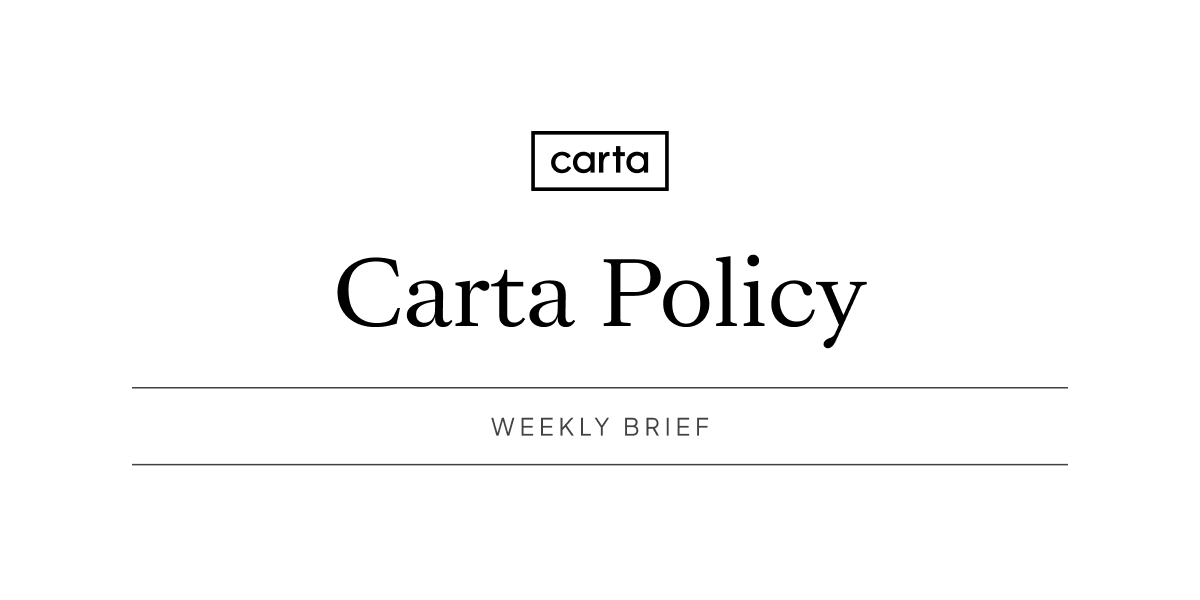Topline
-
Crypto framework passes with bipartisan support in the House, while stablecoin discussions fall apart
-
Senate votes to add outbound investment language to the NDAA
-
AI industry coalesces while Congress debates path forward on AI legislation
-
SEC proposes new AI conflict rules for investment professionals
-
Businesses hit with tax bills as R&D battle continues
Crypto framework passes with bipartisan support in the House, while stablecoin discussions fall apart
This week was a wild one in the world of crypto, as Congress made historic progress on a crypto framework while stablecoin legislation fell apart at the last minute. The House Financial Services Committee and House Agriculture Committee passed landmark legislation this week that would overhaul crypto regulation with bipartisan support. Despite staunch opposition from HSFC Ranking Member Waters, six Democrats voted with Republicans to advance the bill to the House floor. The bill lays out the division of authority between the SEC and CFTC, and ultimately expands the authority of the CFTC as it defines most cryptocurrencies as commodities. To support implementation, the bill appropriates $120 million for the CFTC over the next five years. In a compromise with Democrats, who were concerned about how the bill would impact agency oversight, the updated version of the bill no longer contained a section that would protect provisional registrants from SEC enforcement actions related to listing or offering securities. Crypto industry actors are calling the passage of the bill “by far the most significant legislative moment that we’ve had” related to crypto.
Progress on stablecoin legislation, which was once considered the low-hanging fruit of crypto legislation, fell apart on Thursday morning ahead of the planned markup. HFSC Chair McHenry blamed the White House for an unwillingness to compromise, saying that a bipartisan deal was “closer than we’ve ever been” before White House involvement. The primary friction point in the bill was the extent to which Federal Reserve and state regulators should share oversight of stablecoin issuers. The current version of the bill would allow states to have authority to oversee stablecoins, which is something that the Fed is strongly against. Democrats, led by Waters, want to ensure that Treasury and the Fed support the bill and urged McHenry to delay the markup to allow for more time to get agencies on board. McHenry, however, pushed forward with the votes, where the bill only received votes from Republicans, therefore ensuring that it is unlikely to pass in the Senate.
Why it matters: The passage of the crypto regulatory framework represents a huge win for both Congress and the crypto industry. Congress has been feeling the pressure of calls for regulatory clarity in the crypto industry, and the bipartisan nature of this vote shows that they have clearly been making progress. While it is unclear how the bill will fare in the Senate, the unexpected bipartisan nature of the vote is giving the crypto industry hope. While this bill makes its way through Congress, the SEC will likely continue to regulate by enforcement.
Senate adds outbound investment language to defense authorization
The Senate added a version of outbound investment legislation to the National Defense Authorization Act (NDAA), a must-pass piece of legislation that makes it likely this investment filter becomes law. The amendment would compel U.S.-based companies and investors to notify the Treasury Department at least 14 days before completing non-secured transactions (those not backed by collateral) and within 14 days after the completion of secured transactions involving “countries of concern.” The term enables lawmakers to avoid singling out—at least statutorily—the intended target of the bill: China. The notification requirements would only apply to activities involving the following sectors: advanced semiconductors and microelectronics, artificial intelligence, quantum information science and technology, hypersonics, satellite-based communications and network laser scanning systems with dual-use applications. Proponents of the change emphasize that the notifications would enable Treasury to keep a closer eye on outflows for national security purposes without giving the agency authority to intervene.
Why it matters: The amendment is narrower in scope than previous iterations and a looming White House executive order that is expected to enable the U.S. government to restrict investments in China. The House version of the NDAA does not include a similar provision. And although the House and Senate may disagree, the pressure to act is there. The questions remain: what will need to be disclosed, when, and will the U.S. government have the authority to reject the investment or transactions.
AI industry coalesces while Congress debates path forward on legislation
A hearing in the Senate on Tuesday centered around the risks of AI, with a focus on the possibility of AI being used to create a biological attack. The CEO of AI company Anthropic testified that AI could assist unskilled bad actors in developing weapons, including biological weapons. He noted that AI does not currently have the capability to do this, but he sees it as a “medium-term” future risk. The hearing demonstrated bipartisan consensus that safeguards must be put in place to mitigate the danger associated with the new technology, but little discussion on how this will be done.
The hearing follows a meeting at the White House that took place last Friday, where leading AI companies (including OpenAI, Google, Meta, Amazon, Microsoft, and Anthropic) made commitments to make AI safer. These commitments include watermarking AI-generated content, conducting more research on AI safety and sharing best safety practices across the industry. Notably, there aren’t enforcement mechanisms for the commitments, and many of the commitments are already enacted by the companies involved.
Why it matters: AI is still an amorphous issue for policymakers as they continue to hold hearings to wrap their arms around the risks associated with the emerging technology. Meanwhile, AI companies are beginning to embark on industry-led initiatives, likely frustrated by the lack of progress made by the federal government despite pleas for increased regulation.
SEC proposes new AI conflict rules for investment professionals
This week, the SEC stepped into the AI regulatory fray and voted along party lines to propose new rules to address the potential conflicts of interest in the use of AI by investment professionals. Under the proposal, investment professionals would be required to assess whether the use of AI or predictive data analytics poses any conflict of interest, and if so, eliminate or neutralize those conflicts. This proposal largely stems from the 2021 meme stock saga and the use of gamification tactics by online trading platforms to attract and engage customers. But opponents criticized the proposal for its breadth, suggesting commonly used software, spreadsheets, and other AI applications could be subject to this rulemaking.
Why it matters: SEC Chair Gary Gensler signaled in recent remarks that the agency would be turning its attention to AI and its impact on the financial markets, raising concerns around competition, privacy, and overall financial stability. Unlike cryptocurrency, the SEC doesn’t seem to aim to regulate the underlying AI technology, but rather, how the financial industry is using it in application. This is an area where we could see more action from the SEC, particularly as firms continue to incorporate new technologies.
Businesses hit with tax bills as R&D battle continues
Changes to section 174, which require companies to spread deductions for research costs over five years instead of taking them immediately, are staged to hit businesses with significant tax bills this filing season. Enacted under the Tax Cuts and Jobs Act, section 174 would increase the taxable income for businesses that may have broken even or lost money in 2022, but are considered profitable for tax purposes. This change will impact all businesses small to large, but will hit the cash reserves of small businesses harder than most as larger businesses are better equipped to sustain the expense.
Republicans introduced their trio of tax bills, which included an extension of the R&D incentive retroactively for tax years 2022 through 2025 and an expansion of QSBS, among other provisions. Democrats hold strong, however, that they will not pass R&D tax cuts for companies without restoring the expanded Child Tax Credit. There are several bipartisan policy priorities—China competition, agriculture, and appropriations—that may provide potential vehicles for a variety of tax provisions this year-end. Lawmakers will need to come together to craft an agreement that incorporates both business- and family-focused tax relief if they hope to get their goals across the finish line.
Carta Event: Increasing Regulatory Scrutiny and What It Means for VC
The private market regulatory landscape is changing. As we’ve highlighted, the SEC has issued a number of proposals that would fundamentally impact not only how the private fund industry is regulated, but also how it operates. Private funds are facing more scrutiny from a compliance standpoint as well, and the SEC has brought several recent enforcement actions against VC advisers and their service providers. Join us on August 1st at 10am PT / 1pm ET to learn about these proposed regulatory changes and what they mean for your fund.

News to know
-
Lawmakers ask SEC to abandon “safeguarding” rule. The chairs and ranking members of both the House and Senate Agriculture committees asked SEC Chair Gensler to withdraw its proposed rule on Safeguarding Advisory Client Assets. The group cautioned that the rule would encroach on derivatives and commodities markets, upending the CFTC’s regulatory regime.
-
Ohio Senators seek reprieve for regional banks. Sens. Sherrod Brown (D-OH) and JD Vance (R-OH) teamed up on a letter to FDIC Chair Marty Gruenberg that asked the agency to protect Main Street-focused regional banks in its special assessment. The assessment is necessary to recoup losses from the failure of several banks this spring.
-
Court forces Covington to identify clients in SEC probe. A federal court in D.C. ruled that Covington & Burling LLP must provide the SEC with the names of seven clients impacted by a 2020 hack; far short of the nearly 300 names sought by the agency. The firm is likely to appeal the decision, but the ultimate outcome would have ramifications for disclosure in the legal community.
-
Banc of California agrees to buy PacWest. The health of PacWest was questioned in the aftermath of the failures of three other regional banks earlier this year. Notably, the deal didn’t require an assist from the federal government, which had stepped in to rescue other banks and broker sales earlier this year.
-
SEC adopts cybersecurity rules for public companies. The rule would require companies to disclose significant cybersecurity breaches within four business days after determining they are material to operations or financial condition, as well as annual disclosures concerning cybersecurity risk management, strategy, and governance.
Upcoming events
-
Carta event: Increasing Regulatory Scrutiny and What It Means for VC – August 1 at 10:00 a.m. PT / 1:00 p.m. ET
-
Peterson Institute for International Economics: Can supervisory reforms prevent repeat bank failures in the US? – August 9 at 6:00 a.m. PT / 9:00 a.m. ET

